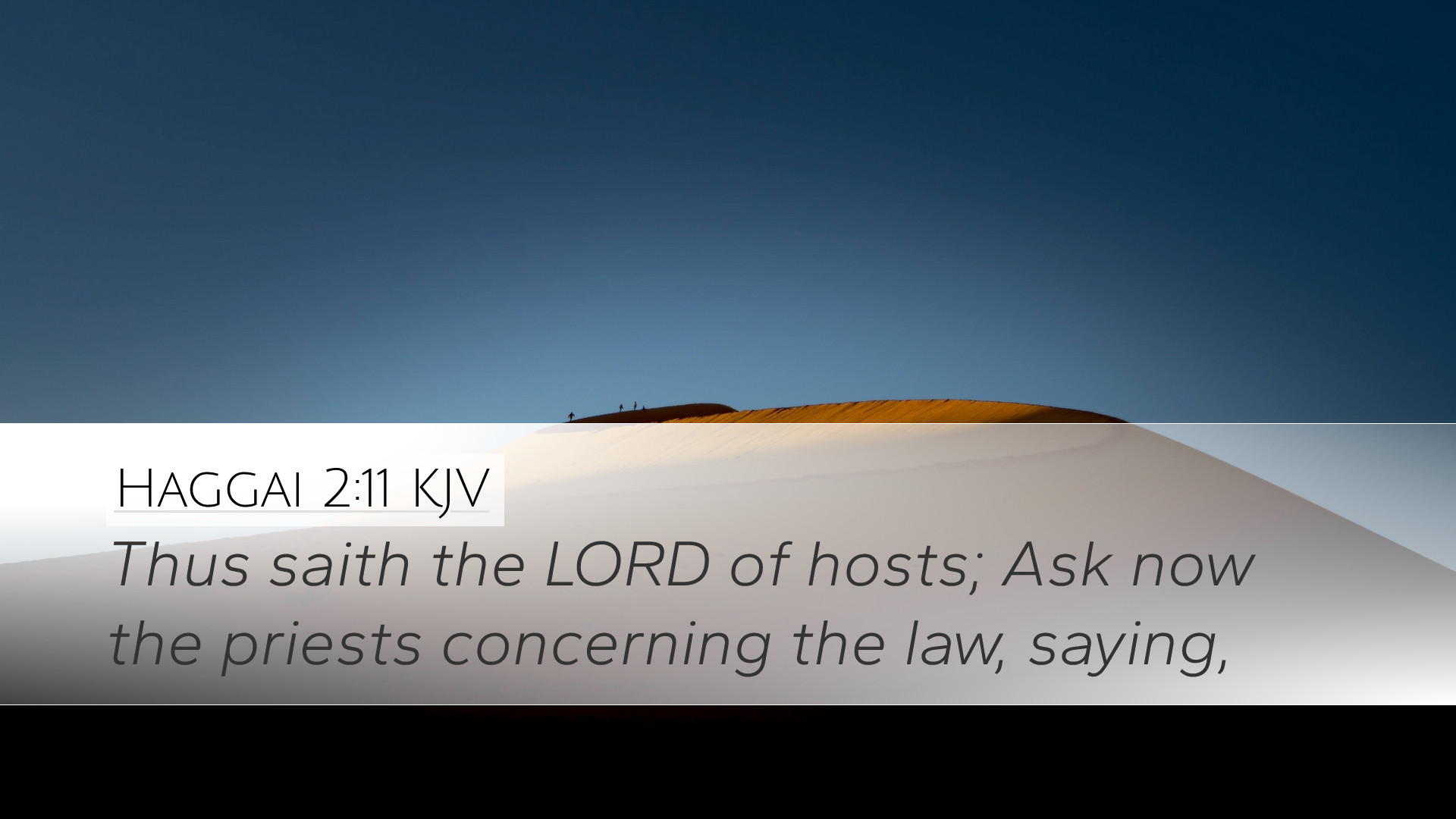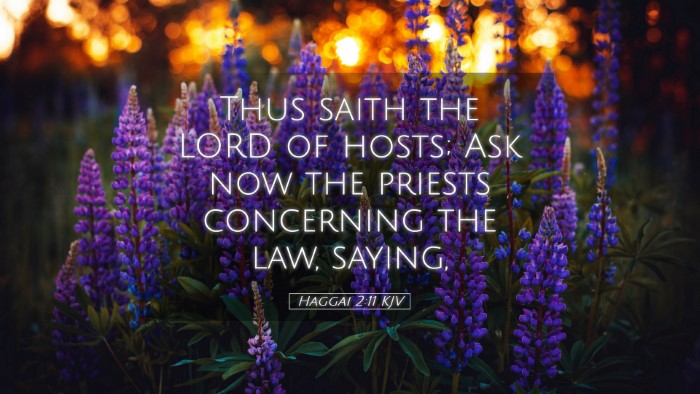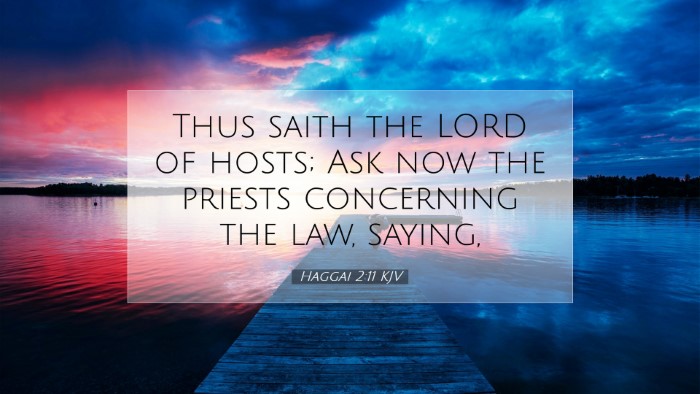Old Testament
Genesis Exodus Leviticus Numbers Deuteronomy Joshua Judges Ruth 1 Samuel 2 Samuel 1 Kings 2 Kings 1 Chronicles 2 Chronicles Ezra Nehemiah Esther Job Psalms Proverbs Ecclesiastes Song of Solomon Isaiah Jeremiah Lamentations Ezekiel Daniel Hosea Joel Amos Obadiah Jonah Micah Nahum Habakkuk Zephaniah Haggai Zechariah MalachiHaggai 2:11
Haggai 2:11 KJV
Thus saith the LORD of hosts; Ask now the priests concerning the law, saying,
Haggai 2:11 Bible Commentary
Commentary on Haggai 2:11
Haggai 2:11 (KJV): "Thus saith the LORD of hosts; Ask now the priests concerning the law, saying,."
Introduction
Haggai, a prophet during the time of the post-exilic community in Israel, focuses on the rebuilding of the temple and the restoration of proper worship. His messages emphasize the significance of holiness and obedience to God’s commands. In Haggai 2:11, the Lord instructs the people to inquire of the priests about the law, which opens a crucial discourse on the relationship between the sacred and the profane, holiness, and communal life.
Historical Context
The context of Haggai’s ministry is vital for understanding this verse. After returning from Babylonian exile, the people of Judah faced numerous challenges, including apathy towards the rebuilding efforts of the temple. The urgency of Haggai's message calls attention to the spiritual and communal dimensions of restoring worship practices and the implications of holiness in the life of Israel as God’s chosen people.
Exegesis of Haggai 2:11
In this verse, Haggai invites his audience to engage the priests in a significant theological inquiry: the nature of holiness as it pertains to the offerings and the people’s conduct. The verse begs several inquiries into the essence of holiness and its transmission within the covenant community.
The Role of the Priests
The invitation to "ask the priests" signifies the importance of their role as mediators between God and His people. The priests were responsible for teaching the law and guiding the people in their religious duties. This underlines the need for authoritative teaching and the necessity of priestly guidance in understanding God's expectations for communal life.
Questioning the Law
Haggai does not merely encourage a passive reception of God’s word but urges an active engagement with the law. By posing questions regarding the law, the prophet emphasizes the necessity of understanding holiness as it relates to the worship practices among the Israelites. This prompts deeper reflections about how communal actions affect their standing before God.
Theological Insights
- Holiness and Impurity: The subsequent verses discuss how holiness cannot be transferred by contact, while impurity can contaminate. This illustrates the deeper theological truth that God’s people must continually strive for holiness, reflecting their identity as a people called by God.
- Community Accountability: Haggai’s call for inquiry highlights the communal nature of faith. It is not just individual piety that counts but a collective return to the ways of God, emphasizing community responsibility in maintaining holiness.
- God’s Sovereignty: Throughout Haggai, one sees a consistent theme of God's sovereignty. This inquiry showcases that God is not silent regarding the condition of His people; He desires them to seek clarity and understanding through His appointed leaders. Thus, forcing the people to confront their practice in light of God's truth.
Insights from Commentators
Matthew Henry
Henry emphasizes that this passage serves as a reminder of the importance of seeking God's guidance in uncertain times. He notes that the inquiry shows a desire to understand God's law more deeply. It challenges believers to assess how their conduct conforms to divine mandates, reinforcing the belief that holiness, not just outward practices, is vital.
Albert Barnes
Barnes points out that the law contained significant provisions regarding offerings and holiness. He highlights the importance of teaching the people about the responsibilities that come with their covenant relationship with God. His commentary suggests that the priests were to clarify what made something holy or unclean, further rooting the ministry of Haggai in practical applications for worship.
Adam Clarke
Clarke delves into the implications of Haggai's directive for communal worship and personal holiness. He emphasizes that the question regarding what defiles or sanctifies should lead to introspection amongst the people. This reflects on their relationship with God, urging them to realign their practices with His commands.
Practical Applications
- Seeking Knowledge: Pastors and church leaders might reflect on how their congregations seek understanding of scripture. Just as the Jews were called to ask the priests, today’s believers are urged to consult their spiritual leaders for illumination on God’s word.
- Community Reflection: The church should regularly engage in discussions about holiness and purity that echo the teachings of scripture. It can foster a culture that prioritizes collective accountability and sanctification.
- Incorporating Holiness in Worship: When planning worship services, leaders should consider the integrative aspects of holiness, ensuring that every element of service reflects the nature of God and His expectations for His people.
Conclusion
Haggai 2:11 opens up a profound discourse on the nature of holiness and the role of the community in maintaining spiritual fidelity. By encouraging inquiry among God’s appointed teachers, Haggai provides a pathway for restoration that resonates through the ages. As pastors, theologians, and students of the Word reflect on this passage, they are beckoned into a deeper engagement with the law of God, aiming for a communal and personal pursuit of holiness that honors the Lord of hosts.


